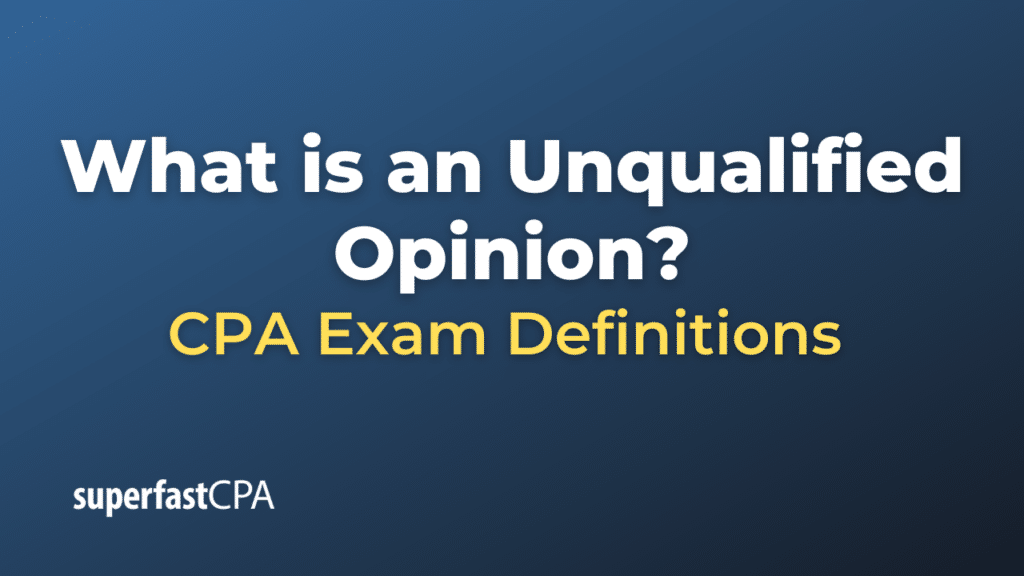Unqualified Opinion
An unqualified opinion is a term used in the context of an independent external audit of a company’s financial statements. When an auditor issues an unqualified opinion, it means that the financial statements have been reviewed and are believed to be free from material misstatements. In other words, the auditor is stating that the financial statements present a fair and accurate representation of the company’s financial position, and they have been prepared in accordance with the applicable financial reporting framework, such as Generally Accepted Accounting Principles (GAAP) in the United States or International Financial Reporting Standards (IFRS) elsewhere.
An unqualified opinion is the best type of report a company can receive from an external auditor. It suggests that the company is transparent and honest in its accounting practices and that investors, regulators, and other stakeholders can rely on the financial statements to make informed decisions.
Elements of an Unqualified Opinion:
- Introductory Paragraph : Describes the scope of the audit and identifies the financial statements that were audited.
- Management’s Responsibility: Outlines the responsibilities of the company’s management in the preparation and fair presentation of the financial statements.
- Auditor’s Responsibility : Details the auditor’s responsibility to express an opinion on the financial statements based on the audit.
- Opinion Paragraph: Clearly states that the financial statements present fairly, in all material respects, the financial position of the company, and that they conform with the applicable financial reporting framework.
- Date and Signature: The opinion will be dated and will include the signature of the auditing firm.
An unqualified opinion does not guarantee that a company is in excellent financial health or that there are no risks involved in the business. What it does indicate is that the financial statements provide a reliable representation of the company’s financial position, according to the auditor’s thorough examination.
Example of an Unqualified Opinion
Let’s look at a simplified example to illustrate what an unqualified opinion might look like in a real-world context. Imagine you’re an investor considering investing in a fictional tech company called “InnovateTech Inc.”
Scenario:
InnovateTech Inc. is a technology company that specializes in creating software solutions for other businesses. The company recently underwent its annual external audit, conducted by a reputable auditing firm, “Precision Audits LLP.
Audit Report:
After conducting a thorough review of InnovateTech’s financial statements, internal controls, and accounting practices, Precision Audits LLP issues an audit report. The key section, the “Opinion,” reads something like this:
Opinion
In our opinion, the financial statements present fairly, in all material respects, the financial position of InnovateTech Inc. as of December 31, 2022, and its financial performance and cash flows for the year then ended in accordance with U.S. Generally Accepted Accounting Principles (GAAP).
What Does This Mean for You as an Investor?
- Reliability : An unqualified opinion from a reputable auditing firm like Precision Audits LLP would give you a high level of confidence that InnovateTech’s financial statements are accurate and in compliance with GAAP. You can rely on these financial statements for making informed investment decisions.
- Transparency: The unqualified opinion suggests that InnovateTech Inc. is transparent in its financial reporting, which is a good sign for potential investors like you.
- Risk Assessment: While an unqualified opinion doesn’t eliminate all risks associated with the company, it does indicate that financial risk stemming from inaccurate reporting is likely to be low.
- Investment Decision: Given the unqualified opinion, you might be more inclined to invest in InnovateTech Inc. as opposed to another company with a qualified or adverse opinion, assuming other investment criteria are also favorable.
Caveats:
- An unqualified opinion is not a guarantee of business success or long-term viability.
- It doesn’t offer insights into the company’s business model, market competition, or other factors that might affect future performance.
- It is merely an auditor’s professional judgment that the financial statements are free from material misstatements and are in compliance with relevant accounting standards.
In summary, an unqualified opinion is a positive indicator of a company’s financial reporting integrity, which can be a crucial factor in investment decisions.













